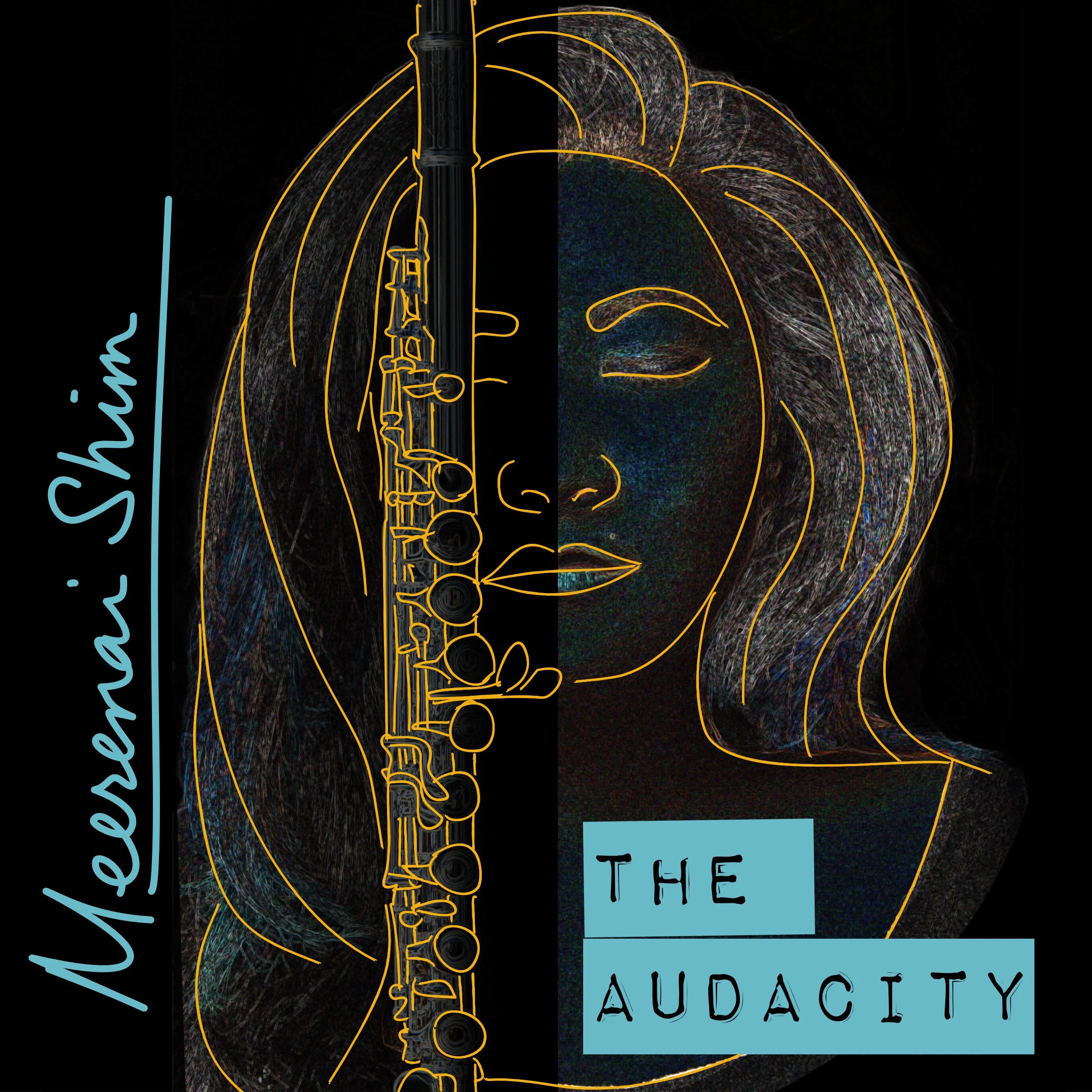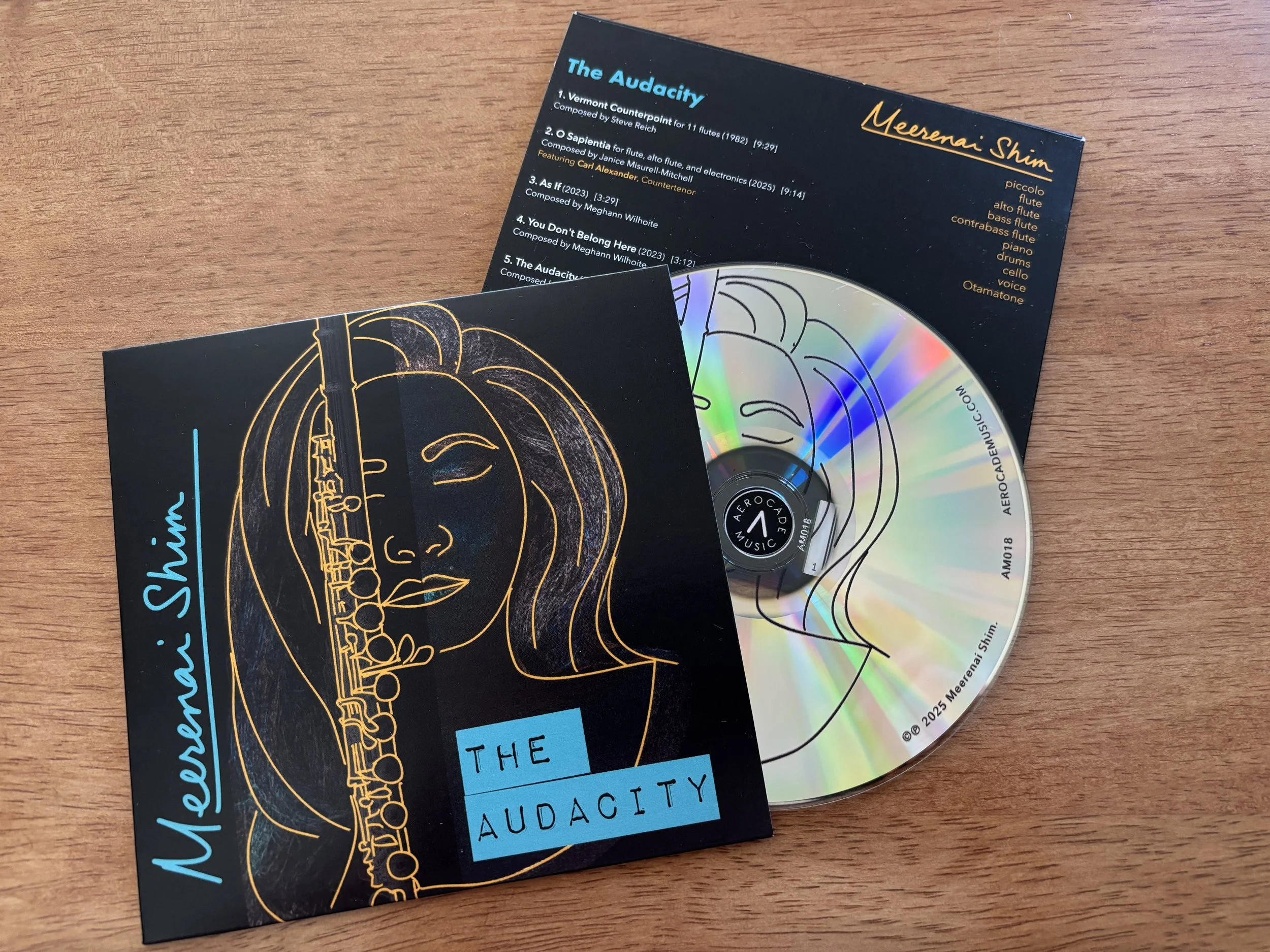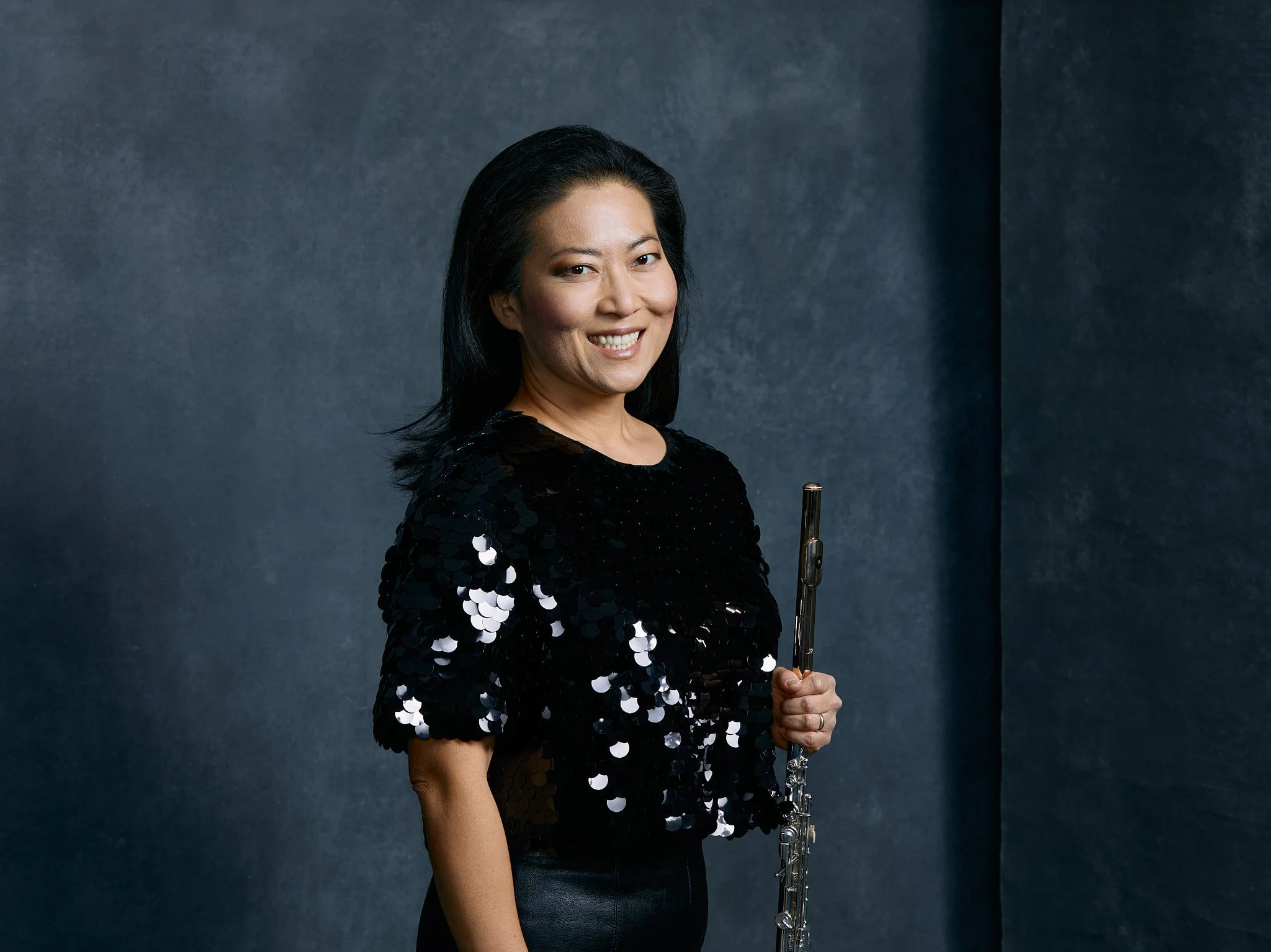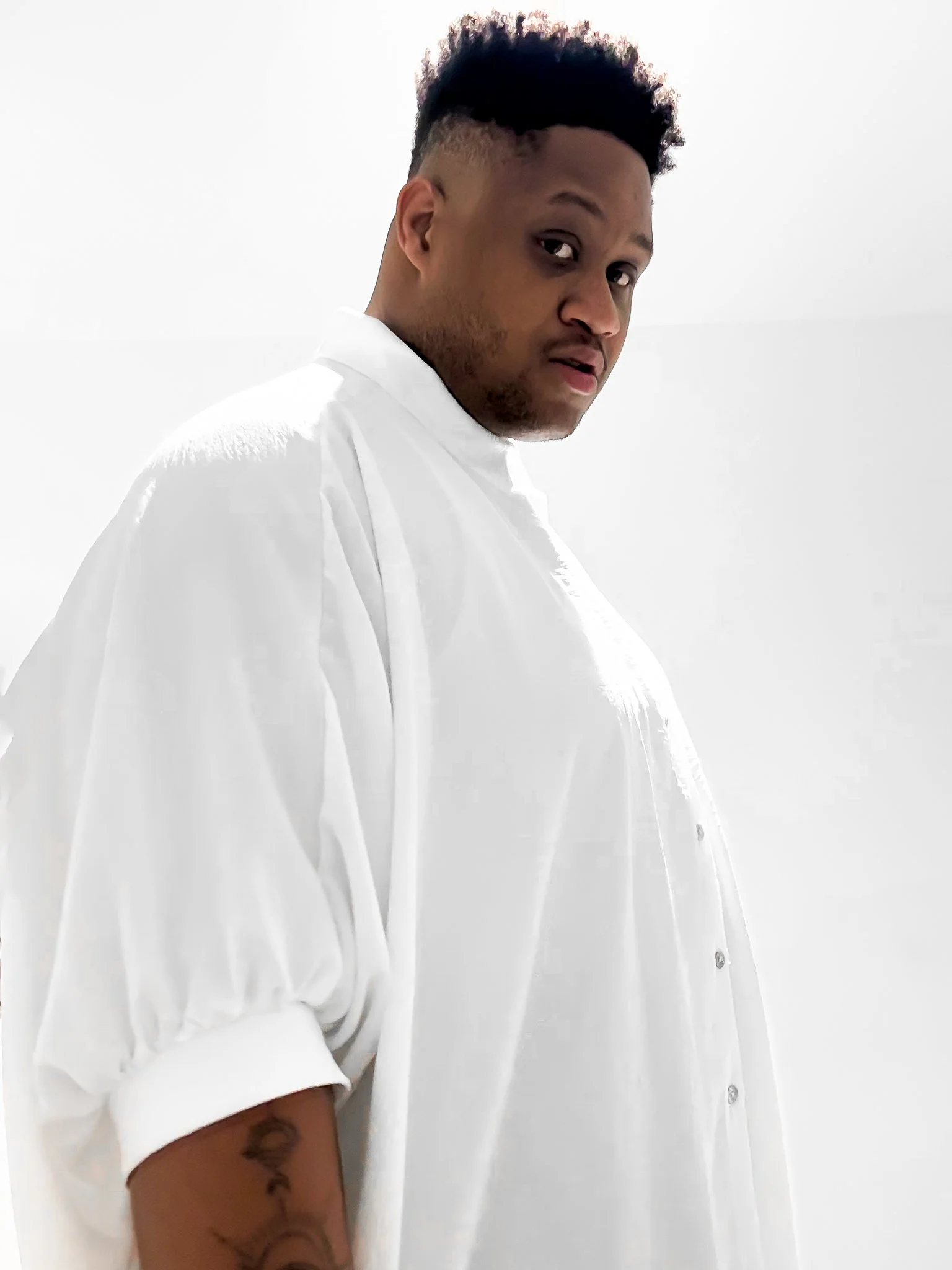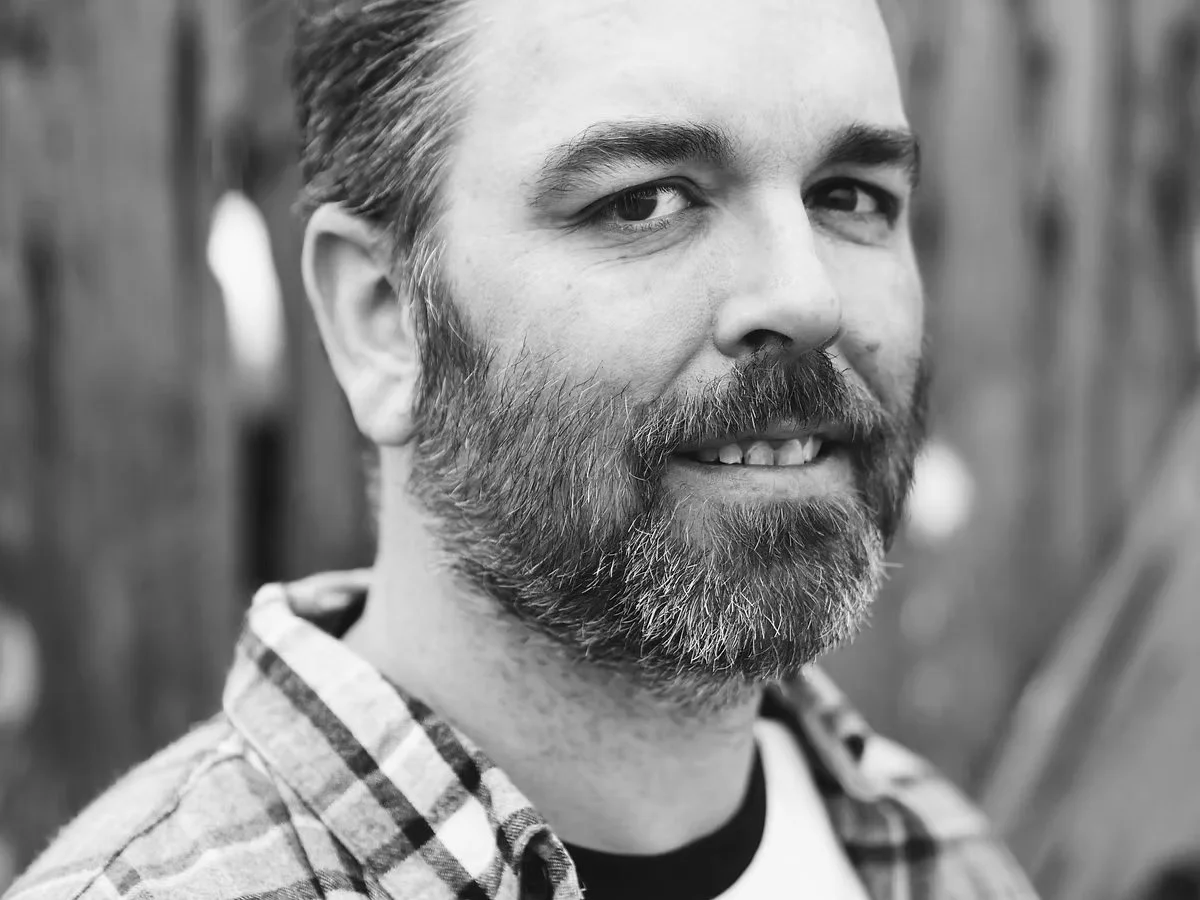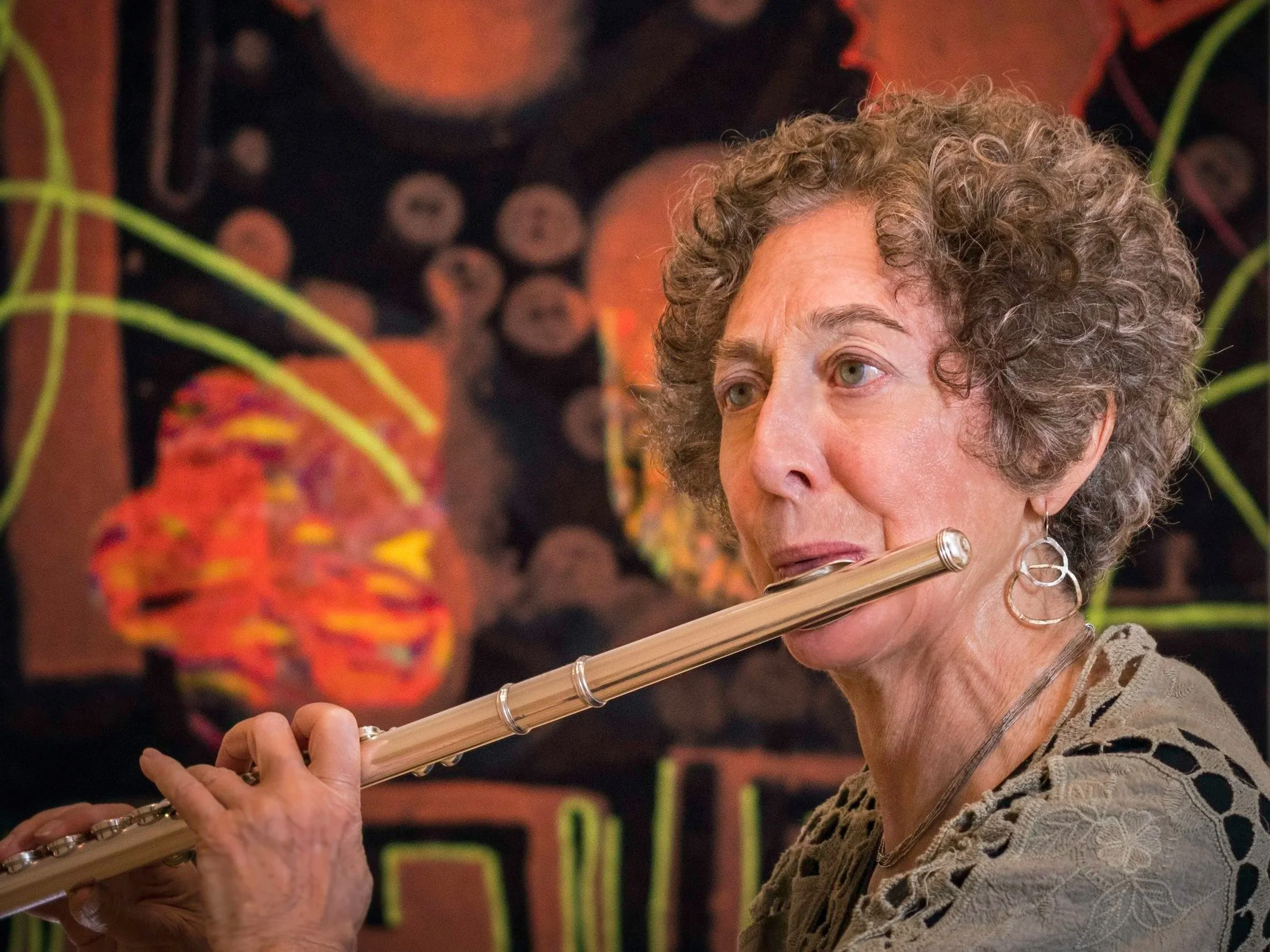Album: The Audacity
Artist: Meerenai Shim
Record Label: Aerocade Music
Catalog No.: AM018
UPC: 195269376215
Release date: September 5, 2025
Format: Digital and CD
Digital booklet: download here
Buy/stream:
Bandcamp | Apple Music | Tidal | Amazon Music | YouTube | Spotify
SELECTED REVIEWS
“A sonically engaging effort, the modern recording techniques illuminates Shim’s superb playing and atypical vision that we can all appreciate.” - Take Effect
“Flutist Meerenai Shim’s new album is a dazzling, cutting-edge recital which is riveting from first to last.”
-Dominic Hartley, Fanfare Magazine
CREDITS
Meerenai Shim: piccolo, flute, alto flute, bass flute, contrabass flute, piano, drums, cello, Otamatone
Carl Alexander: countertenor
Producer: Meerenai Shim
Engineer: Alberto Hernandez
Mastering Engineer: Jett Galindo
Liner notes: Garrett Schumann
Graphic Design: Meerenai Shim
Copyright 2025 Meerenai Shim.
The Audacity
by Meerenai Shim
Ten years since her last solo album, trail-blazing flutist Meerenai Shim releases her fourth. The Audacity combines virtuosic flute performances and modern record production techniques in a delightful sonic package. Anchored by the evergreen “Vermont Counterpoint” by Steve Reich and augmented by newly commissioned works from The Honourable Elizabeth A. Baker, Brent Miller, Janice Misurell-Mitchell, and Meghann Wilhoite, The Audacity is Meerenai’s most cohesive project to date. When she designed the album cover, Meerenai happened to hand-write her name and it turns out that The Audacity is truly her signature recording project.
LINER NOTES by Garrett Schumann
The Audacity showcases an enormous range of flutist Meerenai Shim's musicality, from her principal role as soloist, to other duties as producer, curator, and occasional multi-instrumentalist. Aesthetically expansive, and memorably polystylistic, the compositions featured on the album inhabit emotional worlds that stretch from earnest introspection to pure playfulness. The Audacity is resoundingly contemporary, and presents commissioned works from The Honourable Elizabeth A. Baker, Janice Misurell-Mitchell, and Brent Miller, alongside the music of Meg Wilhoite and Steve Reich. Tying this all together are two themes that are variably interwoven from the album’s beginning to its end: Shim’s voice, both literally and in terms of her creative point of view, and the expressive potential of recording technology.
For example, we hear Shim speak at points in Baker’s Whispers on the Wind and Miller’s Miniatures Book 4: Preset Etudes. Speaking and singing also blend together via extended techniques in the flute part of Misurell-Mitchell’s O Sapientia. But, Shim’s voice also appears in the opportunities afforded her to make meaningful production choices in multiple compositions. For instance, Preset Etudes and the three pieces by Meg Wilhoite call on Shim to customize certain aspects of the instrumentation and audio processing. Wilhoite’s works even feature multiple digital and electronic instrumental parts that Shim recorded herself, including a subtle Otamatone solo Shim added on her own to the scoring for the album’s titular track.
Throughout The Audacity, Shim turns your headphones or speakers into a concert stage as she fully embraces the strengths of her medium to ramify herself via multi-tracking. This characteristic is established by the album’s opening track, Steve Reich’s Vermont Counterpoint, and continues in different ways through the rest of its duration. The results range from vibrantly entwined textures to self-referential duets, but the focus always arrives on the interplay between parts. This factor is enduringly exciting and energetic, whether Shim spits herself to perform auto-polyphony, as in Vermont Counterpoint, or plays against another soloist, as with countertenor Carl Alexander in O Sapientia. Even the process of creating the recording of Whispers in the Wind, which involved Shim and Baker remotely exchanging video and audio files, demonstrates another form of technologically-assisted interplay critical to this album’s distinctive point of view. In this way, The Audacity’s central themes act as cornerstones for its most playful and thoughtful expressions, and enable Shim to display a truly twenty-first century virtuosity on center stage as a performer, and in the background as a producer.
The recording of Vermont Counterpoint that opens The Audacity follows an invitation to future performers composer Steve Reich includes in the work’s score, “if a performer wishes to make their own pre-recorded tape they are encouraged to do so.” Originally written in 1982 for flutist Ransom Wilson, Shim’s version of the piece announces the album’s focus on multi-tracking and production techniques by using panning to create a listening experience more immersive than any recital hall.
Vermont Counterpoint’s scoring mixes multiple flute, alto flute, and piccolo parts. Shim’s choice to record these anew results in a lively, reflexive din in which ten avatars of her performing self exist in synchronized conversation. In his program notes for the piece, Reich describes, “the compositional techniques used are primarily building up canons between short repeating melodic patterns by substituting notes for rests and then playing melodies that result from their combination. These resulting melodies or melodic patterns then become the basis for the following section as the other surrounding parts in the contrapuntal web fade out." The music is unrelentingly fast, but its many layers and the interactions of its various short, repeating melodies occasionally and magically lead to moments of undulation. The voices of Shim's flutes come together in bounding, joyous waves; then, the pattern changes and this process starts over again.
The Audacity continues with Janice Misurell-Mitchell’s O Sapientia, for flute and countertenor. As the composer notes, the work, “is based on an Antiphon about wisdom by Hildegard von Bingen, the German Benedictine abbess and polymath of the Middle Ages.” Fittingly, the piece opens by evoking a distant past with Shim’s alto and bass flutes sounding like an organ holding an open fifth and Alexander’s solo suggesting a sacred chant. From here, the soundworld expands rapidly. Shim’s flute parts begin a jagged counterpoint typified by various extended techniques, including breath and percussive sounds, harmonics, as well as singing and speaking through the instrument. Alexander’s voice part begins to mirror Shim’s playing and also contributes to this tapestry of non-traditional sounds. By also exploiting multi-tracking, the vocal solo slides through layers of singing, speaking, and a range of expressions that sit between those two.
The next three works on The Audacity are by composer Meghann Wilhoite and mark the first tracks on the album to be tongue-in-cheek and emphasize the explicitly playful side of its personality. As Wilhoite explains in her program note, “These three pieces originated as an EP for my electronic music project, death of codes. Early on in its creation, Meerenai contacted me about writing a piece for her next album, and I suggested that she "cover" the three tracks of the EP—which she has done to brilliant effect.” The set of short compositions signals both an acceptance of a contemporary technological reality and willingness to play around with any available sounds and musical ideas. As a result, it is easy to hear references to other kinds of music in Wilhoite’s composition, such as certain kinds of dance music or video game scores.
As If, the first of Wilhoite’s pieces, features a relentless cello melody, driving drum beat, and vocoder part that delivers the text:
time to defeat final boss.
as if!
as if!
you think you've got me?
you think I've shown you all I've got?
as if!
as if!
Shim performed and recorded the cello and drum elements herself in addition to the alto flute and contrabass flute parts, and Wilhoite’s program note observes Shim’s even deeper contribution to the piece. “‘As If’ was very much inspired by Meerenai herself,” Wilhoite writes, continuing, “both her work in the chiptune world and also her fearless approach to the music industry, which often feels like an obstacle course of flaming sticks and final bosses."
Next is You Don’t Belong Here, which adds a piano part to the familiar cello and drum sounds heard in As If. The piece is relaxed with an austere edge. Wilhoite notes it, “is about the epic internal battle that occurs when we decide to weed out negative self-talk and other acts of self-brutality.” Shim performs flute, alto flute, and bass flute parts that converge in a closing flute choir. And, Wilhoite’s final work on the album is its titular track, The Audacity. More ominous, and rock-adjacent than the other two in the set, this piece features distinct performances by Shim as a flutist and performer. Wilhoite describes the work as, “about the masks we craft for ourselves in order to feel accepted in a sometimes unfriendly world, and the bravery needed to remove that mask for true self-actualization.”
The album continues with Brent Miller’s Miniatures Book 4: Preset Etudes, which further explores the electroacoustic, polystylistic, and playful characteristics introduced by Wilhoite’s compositions. Here, Shim plays against a series of volatile electronic beats, in addition to providing a spoken introduction and conclusion to the work that embodies the instruction manual to Miller’s Korg drum machine. The playfulness of Preset Etudes emerges from three elements: the content of the flute parts and their relation to the tradition of etude-like music and method books, the unpredictability and eclecticism of the sampled sounds that compose the beats, as well as the mixture and juxtaposition of both these components. There is also a longitudinal factor, as moving through the set of six short pieces involves several sudden and stark contrasts. The resulting surprise is just as thrilling as the journey of exploring the new musical world presented by the next miniature.
The Audacity concludes with The Honourable Elizabeth A. Baker’s Whispers on the Wind, which coalesces the varied web of musical worlds Shim explores in the album’s preceding works. Of course, there is multi-tracking in addition to speaking, other extended techniques — including the use of flute with glissando headjoint — and a range of electronic sounds. A return to the more earnest and spacious abstraction explored in O Sapientia, Baker’s program note explains, “Whispers on the Wind explores the liminal space where wishes of the heart are made and answers to questions, that one never speaks aloud, are softly carried on streams of air." One of the piece’s most distinguishing elements is its video score, which is meant for the performer alone to see, even in a live setting. The ‘CODEX’ Baker created to explain the video score describes its basic visual elements: "Big circles low pitch deep pitches in the lower range", “Text is read into the flute breathy and hanging on sibilance", “Chaos dots are a mixture of sounds of any choice with separation at the atomic level they build in the electronics as a wall of sound.”
In Whispers on the Wind, the studio plays its part in the creative process, which represents a fulfilling apotheosis to The Audacity’s many embraces of recording and electronic production technology.
Garrett Schumann (1987-) is an award-winning composer, music scholar, educator, and writer based in Ypsilanti, MI. Garrett’s compositions have been performed around the world by leading soloists and ensembles including the BBC National Orchestra of Wales, Akropolis Reed Quintet, vibraphonist Joel Ross, Latitude 49, the percussionists of the Detroit Symphony Orchestra, Megan Ihnen & Alan Theisen Present, violist Michael Hall, and many more. A community-centered composer, Garrett’s recent projects include collaborations with the Ann Arbor District Library, the Michigan branch of the diversity and public art nonprofit Embracing Our Differences, and other local partners.
Garrett served as the Executive Director of the nonprofit ÆPEX Contemporary Performance from 2015-2022. Under Garrett’s leadership, ÆPEX featured the music of nearly 120 composers at more than 30 concerts and community music events at venues in Ypsilanti, Ann Arbor, Detroit, Kalamazoo, and Mt. Pleasant.
Garrett’s scholarship and writing on music has appeared inThe New York Times, NPR, Grove Music,Cambridge University Press’s Public Humanities journal,VAN Magazine, and many other outlets. He regularly presents his original research at conferences and university guest residencies. Garrett teaches a variety of music courses for the University of Michigan College of Literature, Sciences, and the Arts.
ABOUT THE PERFORMERS
Photo credit: Veronique Kherian
Meerenai Shim
Translated in Korean as “Milky Way” or “Galaxy”, the artistic career of Meerenai Shim (pronounced “ME-ren-ey”, like they) is appropriately expansive and all-encompassing. A flutist with a new music focus, she promotes contemporary work through myriad channels, including as a solo performer, as a record producer, her chamber ensembles, and her own discography of three previous solo albums, all of which have been warmly reviewed.
Meerenai has performance credits across the United States, including within the Soundwave Biennial in San Francisco, the Bang on a Can Summer Festival, the National Flute Association’s annual Conventions, and numerous universities. Her impact across new music manifests in part from her two chamber ensembles: she is involved as a founding member of the innovative flute and percussion duo, A/B Duo (2013) and joined contemporary flute trio Areon Flutes in 2016.
Outside of performance, Meerenai founded the independent record label Aerocade Music in 2015, which has released numerous albums to date of contemporary classical, electronic, and experimental music from the West Coast. She has also produced albums for the Post-Haste Reed Duo, percussion ensemble Clocks in Motion, flutist Elizabeth Robinson, and the Chamber Winds of South Dakota in addition to her own chamber groups’ and solo albums.
Meerenai Shim holds degrees from San Francisco State University (M.M.) and DePaul University (B.M.). Meerenai is also a Guild Certified Feldenkrais Practitioner(CM) and has been a movement coach for musicians since 2012. She makes her home in Silicon Valley with her husband Dave and their Pit Bull mix, Pebbles.
More at meerenai.com.
Photo credit: Adore Photography
Carl Alexander, Countertenor
Hailed as “exceptional...[with] a beautiful and powerful voice,” by The Harlem Globe, Carl Alexander is a budding American artist known for his captivating performances which incorporate contemporary literature and gems of the past.
While at Morehouse College, he was featured frequently as a soloist with the Morehouse College Glee Club and as a member of the Morehouse Quartet. He received his Bachelor of Arts in Music and studied with Dr. Mel Foster. He received his Master’s degree in Voice and Opera Performance from Northwestern University where he studied with W. Stephen Smith.
Alexander has had the pleasure of embodying masterworks such as Britten’s Canticle II: Abraham & Isaac, Pergolessi’s Stabet Mater, Durufle’s Requiem, Orff’s Carmina Burana, Bach’s Magnificat, and Vivaldi’s Gloria to name a few. He has championed creating new works, premiering dozens of new works for voice from composers all over the United States while redefining the art of recital, such as his acclaimed work, Shelter, that challenged his audience on concepts of the Black psyche and post traumatic slave syndrome.
His community work as an artist continues to focus on telling new stories that give a platform to marginalized voices. Alexander is constantly seeking groundbreaking ways to collaborate with composers and artists to enhance the classical music narrative that showcase (the same) works written by (the same) white men from centuries ago. Instead, Alexander believes that through performance, we can hold a mirror to the world and allow it to see itself, in all its shades and experiences.
ABOUT THE COMPOSERS
The Honourable Elizabeth A. Baker (Photo: self-portrait)
The Honourable Elizabeth A. Baker is a new renaissance artist whose work is best expressed as a constantly evolving practice that doesn’t fit neatly into definition or expectation boxes. It is an artistic body of work vast in scope and scale outside of the confines of a simple elevator pitch, unrestrained and unencapsulated.Elizabeth has received recognition from press as well as scholars, for her conceptual compositions and commitment to fostering introspective healing spaces within her work. Elizabeth is a certified Reiki II in the Usui Shiki Ryoho System Of Natural Healing.
In addition to studies of her work, Elizabeth has been awarded several fellowships, grants, and residencies, in addition to sponsorships from Schoenhut Piano Company and Source Audio LLC. As an experimental filmmaker, her work has been shown at festivals including Women of the Lens (United Kingdom), and the African Smartphone International Film Festival (Nigeria). As a solo recording artist, Elizabeth is represented by Aerocade Music, her first solo album on the California-based label Quadrivium released worldwide in May 2018 to rave reviews. She is the founder and former executive director of the Florida International Toy Piano Festival, The New Music Conflagration, Inc., author of four books, and the subject of a number of scholarly articles, thesis papers, and other academic research. Elizabeth is a recipient of a 2019-2020 Individual Artist Grant from the State of Florida as well as a commission for The Great Black Music Ensemble through the American Composers Forum (ACF) Connect programme in partnership with The Association for the Advancement of Creative Musicians (AACM Chicago). Elizabeth is the 2021-2022 Rieman and Baketel Fellow for Music at Harvard Radcliffe Institute for Advanced Study.
Brent Miller (photo: self-portrait)
Brent Miller (b. 1978) is a composer, performer, and arts administrator based in San Francisco, CA. Recent projects include works for Rova Saxophone Quartet, violinist Eric km Clark (Southland Ensemble, EAR Unit), Dither Electric Guitar Quartet, and Sqwonk. He has received grants from Zellerbach Family Foundation and American Composers Forum to fund his work. He studied composition at the University of Arkansas with Robert Mueller and University of Missouri-Kansas City with James Mobberley and Paul Rudy.
Brent is active in the arts administration field founding and serving as Managing Director for The Center for New Music in San Francisco, a work/performance space that supports creative music, as well as managing Rova:Arts, a non-profit organization that supports Rova Saxophone Quartet. He also has worked with Other Minds, helping to produce the annual Other Minds Festival, and is a founding member of The Collected, a group dedicated to the advancement of new music.
Janice Misurell-Mitchell (photo: Marc Perlish)
Janice Misurell-Mitchell, Chicago composer, flutist and vocal artist has taught at the DePaul School of Music and the School of the Art Institute of Chicago, and performed in the US, Europe, Morocco, Lebanon, Palestine, Israel, Taiwan and China. For 25 years she was a performer and Co-Artistic Director of CUBE Contemporary Chamber Ensemble; she is now a member of the 6Degrees Composers and also performs with Freedom From and Freedom To, an improvisatory dance and music ensemble. Recent commissions are from the Chicago Composers Orchestra, the Ear Taxi Festival, and flutist Meerenai Shim. Other awards include the Pauline Oliveros New Genre Award (2024) from the International Alliance for Women in Music, an Artists Fellowship from the Illinois Arts Council, grants from the Chicago Department of Cultural Affairs, residencies at the Ragdale Foundation, and commissions from the National Flute Association, the Youth Symphony of DuPage, Northwestern University and numerous performers. Her solo CDs, Vanishing Points, music for solo, duo, quartet and Uncommon Time, music for flute, voice and percussion, are on the Southport Records label. Other music of hers is available through MMC Recordings, OPUS ONE Recordings, Capstone Records, Arizona University Recordings and meerenai.com. Her videos Karawane, After the History 2023, Sermon of the Spider and others are available on Youtube.
Meghann Wilhoite (photo: self-portrait)
Meghann Wilhoite is a lapsed pipe organist and active electronic music producer and vocalist. She began her musical journey as a child playing piano and singing in choirs. Her college piano instructor suggested that she study pipe organ, which led to a 17-year career on the bench, in churches in Florida and then New York City.
In 2013, she downloaded a DAW and began releasing music as death of codes (dark-pop-like songs) and pillar of garbage (ambient tracks). She has contributed vocals to songs by other artists, primarily in the witch house genre. You can also catch her writing screenplays and acting in independent films.

